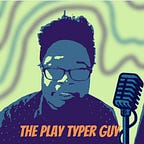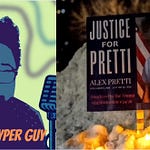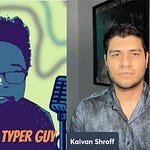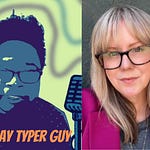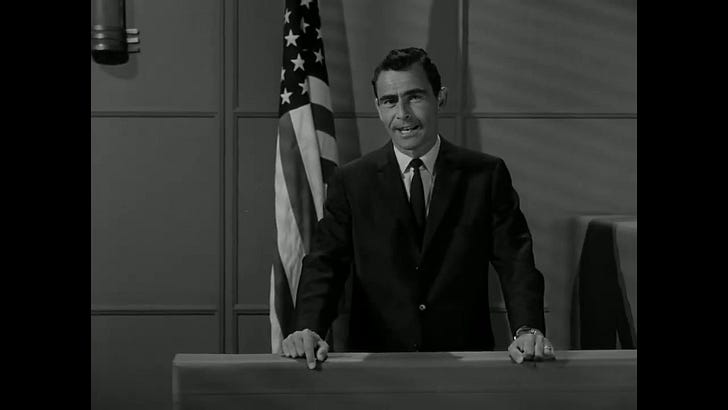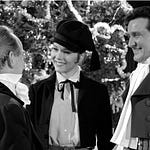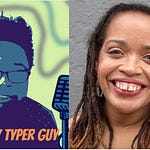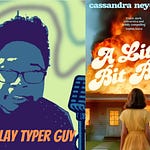The Avengers remains my favorite TV series, so I was thrilled to speak with Michael Scott Phillips, author of Quite Quite Fantastic!: The Avengers for Modern Viewers (The Grande Marque Edition). Pop open some champagne, watch out for diabolical masterminds, and enjoy.
Transcribed excerpts from our conversation:
SER: I’m delighted to have a fellow Southerner joining me — I’m from South Carolina. You’re from Georgia — to discuss our mutual affection for an almost 60-year-old British TV series, The Avengers. Can you tell me about your particular interests and what inspired you to write this book?
MICHAEL: I’ve been an Avengers fan ever since I was a teenager. I’ve always said that Doctor Who was my gateway into British cult television, my gateway drug. So in the 1980s, the PBS station in Georgia showed virtually everything British that was cult. You had Doctor Who. You had Monty Python. You had The Avengers. You had Blake’s 7. You had The Prisoner, all kinds of stuff.
I was not a big fan of American ‘80s television at the time. A lot of people see it as a classic era now but it wasn’t really my thing. I watched all these old British TV shows that were in syndication. So I became a fan of The Avengers.
It just seemed like there were several renaissances over the coming years. There was another one in 1990 when A&E showed all the Honor Blackman episodes for the first time.
So that was the second period of interest for me and then the third was when the big theatrical release came out in 1998 and then the DVDs started coming out from A&E. It was around that period in the late ‘90s I started writing a website that was intended to review all the episodes because we were watching a lot of them for the first time or the first time in a long time. The website was called Quite, Quite Fantastic Avengers Limited originally.
SER: I was a fan of the website.
MICHAEL: Oh, good. Some people still remember it. So that’s where it all started. Then for various reasons, it sort of got dropped before I managed to review all the episodes. I was looking for something that I wanted to collate into a book. Around 2018, I thought, “Well, I’ve got these all these old reviews. I can just easily put them together and do a little editing and it’ll make a book,” but I ended up basically redoing everything because opinions had changed, my writing was better, and I just felt like I could do a better job. So I ended up rewatching every episode and and re-reviewing everything, and that’s how the book came about.
SER: You talk about the book being for the modern viewer. [December] is the 60th anniversary of when Diana Rigg starting filming The Avengers. When you and I started watching the show, that was like a 16-year-old now watching old episodes of The X-Files. Yet, I don’t think it’s just my middle-aged nostalgia that makes me think the show still holds up quite well.
MICHAEL: It’s an unusual show in that it has survived the test of time much better than many shows from the 1960s. I think one of the reasons why is it just had a very high production standard for its day, even if you like put it up against the top notch, highly budgeted productions out of America at the time … This came from being like a videotaped show. This is this was a show that [in its first three seasons] had the same production values as William Hartnell-era Doctor Who.
Maybe they had a little more artistry from the beginning, but then it really comes out in the film era, and it starts to look very film noir. It looks like the films of the day, really, to me. I compare it to like a lot of the British cinema that was coming out at the time.
One of the reasons for this was because a lot of the directors that were working on the show that they were pulling in, they were pulling them in from the British film industry, which was in a kind of crisis and was kind of falling apart. It wasn’t being as successful as it had in the past. And so they had all these film directors that were essentially out of work. A way for them to get more work was to move into television. That was all [producer] Albert Fennell’s idea. He was the guy who had the film background amongst the two producers, and he was brining in a lot of talented film directors who boosted the image of the show tremendously.
SER: The book title, Quite Quite Fantastic!, comes from the final black-and-white episode, “Honey For The Prince,” which is another one that’s fun but also slightly campier. You see where it could potentially be a fifth season color episode as opposed to the early episodes [from the fourth season.]
MICHAEL: [“The Girl From Auntie”] is the transition point, in my opinion — the first one that feels like a fifth season episode.
SER: Absolutely. Obviously, there were high body counts as a spy show, as a drama, but where it wasn't necessarily a joke [like in “The Girl From Auntie”]. We see much more of that in the fifth season, the reaction to death was almost as everyone knows it’s a TV show, and we’re just having fun with this. They do sort of pull back from that later [in Rigg’s era]. They start doing much more serious stories, and “Murdersville” is one where the show presents the deaths as tragic. Mrs. Peel is genuinely hurt that her friend has died. It’s not campy or jokey like in “The Girl From Auntie,” which I absolutely adore because it’s hilarious.
MICHAEL: I love the witty banter [of The Avengers] probably most of all. I think that is a feature that goes all the way back to the beginning of the show. It’s just a matter of intensity or concentration of it. I think it reaches a peak in the fourth and fifth seasons, probably because the chemistry between Diana Rigg and Patrick Macnee was so good.
Diana Rigg was so good at that witty banter and just delivering a line with with so much nuance to it. She could put a little bit of aristocracy into the most humorous line or she could put a little bit of humor into the most serious line. She was extremely good at the subtlety of her expressions, too.
SER: The issue of automation comes up a lot in the series. I wouldn’t say it’s dated [considering concerns about AI]. It’s in “The Cybernauts” and later “The House That Jack Built,” when the villain is someone who believes that machines are superior to people. He’d wanted to automate [Mrs. Peel’s company]. She’d fired him, and he now wants revenge. I was watching [“House That Jack Built”] recently during Jodie Whittaker's run on Doctor Who, and it’s interesting to see the ways how Diana Rigg’s Emma Peel was like the Doctor, especially in the modern era. She’s dashing but also brilliant and able to think through problems.
MICHAEL: It’s a tour de force for her. I mean, she’s got to do a lot in that episode and she’s got to do a lot with very little, because she hardly has any lines. It’s all about the frustration she displays on her face, whether she’s looking hopeful, whether she's looking fearful, whether she's uncertain or confident or whatever, and it all plays on her face. She only has this insane escaped convict to talk to, and then only briefly. So, it’s a lot of work for her, and I think she does a bang-up job. She had tremendous range as an actor.
Watch the full interview on YouTube below or download the podcast version above. Please like, share, and subscribe. You can order a copy of Quite Quite Fantastic! here.


